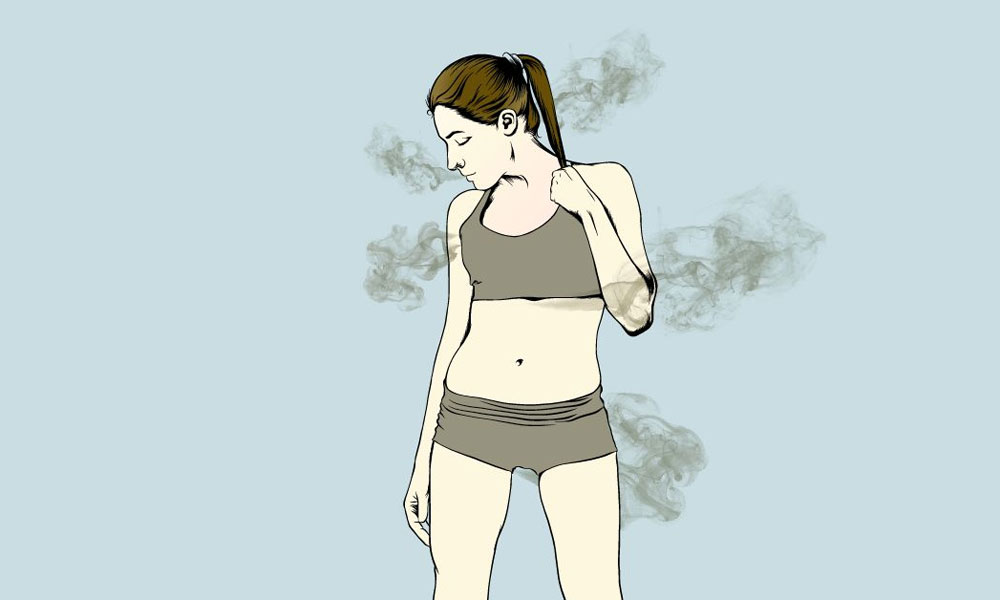
We all suffer from body odor from time to time, but if it’s just coming from your armpits after a sweaty day at the gym, it’s probably harmless.
However, you should never ignore several different body odors because they can be symptoms of other more significant problems.
Smelly body parts aren’t a glamorous subject, so many of us don’t know what’s normal and what warrants a trip to the doctor. But being aware of irregular body odors can help you take control of your health and well-being, even if it scares you.
But some odors aren’t just unpleasant because they can indicate an underlying health problem.
Here are seven body odors never to ignore:
1. Fruity breath
While “bad breath” may sound pleasant, it can signify something serious. The condition of diabetic ketoacidosis (DKA) causes insulin deficiency and increased blood sugar levels. KDA forces the body to burn primarily fatty acids for energy, leading to the formation of acidic ketones.
One such ketone, acetone, gives off a “fruity” odor, indicating a serious (fatal) health problem. You should visit the emergency room if the symptom is accompanied by vomiting, frequent urination, or abdominal pain.
2. Funky shoes
Anyone who has used a pair of athletic shoes for a long time will show their smelly nature. It is when this smell resembles the smell of your feet that you should listen carefully. Chronic foot (and shoe) odor is often a symptom of a bacterial or fungal infection. This can irritate the webbing of your skin.
Smelly feet are hardly rare, but if your feet are constantly stinky, there could be more significant problems behind the scenes. You can have many fungal infections on your feet and, in worse cases, bacterial infections.
These need to be treated to ensure your feet stay in top shape, so if you’re afraid to walk around barefoot because of the noticeable smell, see a doctor.
To prevent this nastiness, use an over-the-counter antifungal spray first. If symptoms persist, see a doctor or specialist (podiatrist).
3. Strong-smelling poop
Well, let’s try to make this quick, shall we? If your small intestine doesn’t produce enough lactase, the digestive enzyme, it can’t properly digest lactose — the sugar found in most dairy products.
As a result, lactose is fed directly into the colon instead of the intestine (which is where it should go.) At this time, more than 100 people have destroyed their bodies.
It is best to check everything with a doctor. It can determine if any complications in the bowel are to blame. If not, taking an extra lactose enzyme (such as Lactaid) may help.
4. Pungent urine
It is usual for the smell of urine to change from time to time (eat some asparagus and see what happens). For example, dehydration causes a higher concentration of minerals to pass through with less fluid. If one is sufficiently hydrated, the smell will usually become non-porous.
But when bacteria enter the etheric tract, our cookies smell especially bad. Also, foul-smelling urine that is cloudy or bloody can be a sign of a UTI. Usually, yeast infections are treated with antibiotics. Staying hydrated, taking vitamin C, and taking probiotics can help prevent this condition.
No one wants to bring up the odd smell of their urine, but if it seems particularly noticeable, you should mention it. Strong-smelling urine can signify a urinary tract infection (UTI), leading to severe problems if not treated medically. Fortunately, getting rid of UTIs is simple as long as you visit a clinic or doctor.
5. Inexplicable bad breath
If you brush your teeth, floss, rinse your mouth — all of that — and still can’t get rid of bad breath, you may be dealing with sleep apnea or another sleep disorder.
Sleep apnea forces a person to breathe heavily through the mouth all night; this creates a parched mouth, which is the leading cause of harmful breath complications. Sleep apnea – and poor sleep quality in general – is linked to severe illnesses such as diabetes, heart disease, and high blood pressure.
Medical treatments and devices are available to open the airways and provide more restful sleep. This should also help improve body odor. To rule out any of the conditions mentioned above, it is still necessary to consult a doctor.
6. Smelly sweat
Sweat doesn’t smell good, but it shouldn’t smell like road kill. While it’s normal for some regions of the body – your armpits, for example, to process odors more strongly than other parts of your body, it shouldn’t smell anything out of the ordinary. By using “ordinary people,” doctors mean that the strong smell from certain places spreads to other body parts, as mentioned above.
Fortunately, the cause is usually not serious. Usually, some relative in your digestive system is to blame. Simple dietary changes, such as adding more fiber, can help. If digestive issues persist, plan to talk to your primary care physician about this body odor.
7. Sour smell around the vagina
It is usual for the vagina to process a slightly sour smell, an undetectable odor. But if the smell around the vaginal area is powerful (“fishy”) or stale, it may indicate a condition called bacterial vaginosis (BV). BV is an inflammation of the vagina caused by an overabundance of the naturally occurring bacteria Gardnerella.
Everyone has a different vaginal odor, which can even change at other times of the month, but if you have a persistent fishy smell, you should see a doctor for treatment.
BV is very common and affects about 30 percent of women in the United States. A simple bacterial imbalance, BV can usually be treated with prescription antibiotics or topical gels.